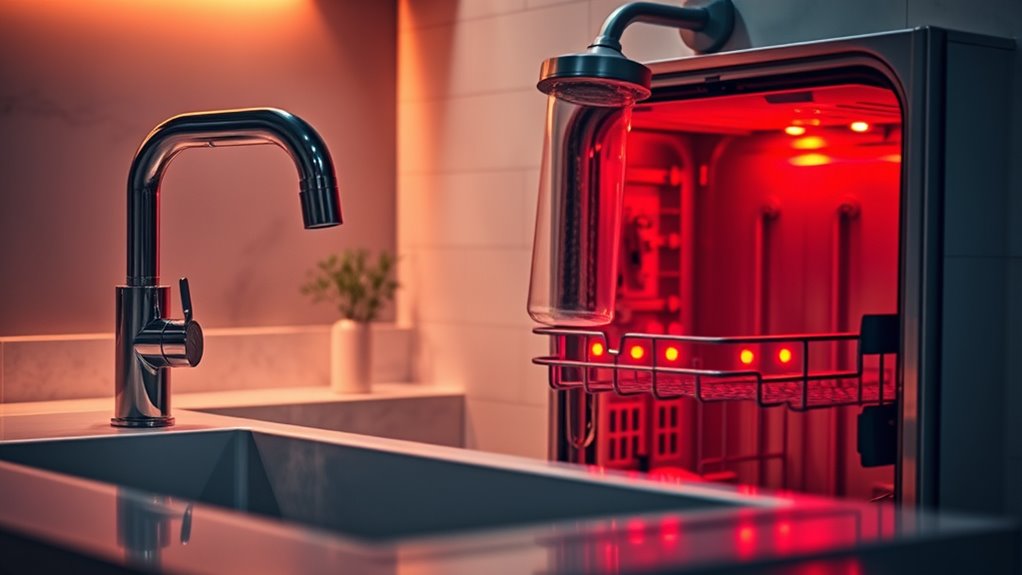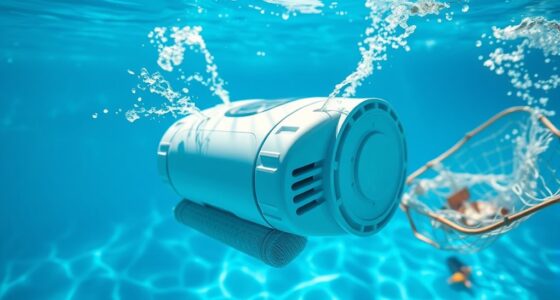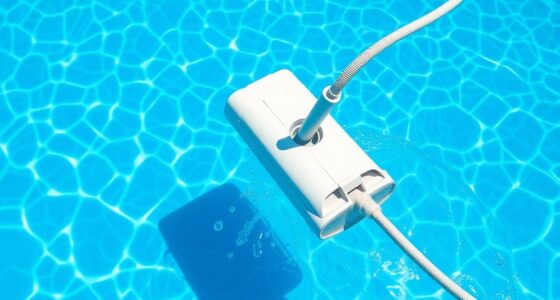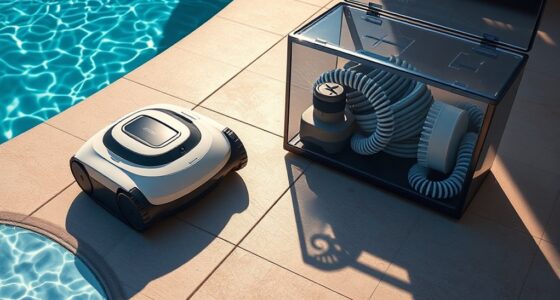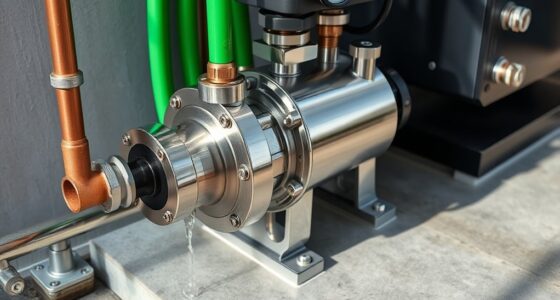Your dishwasher uses hotter water than your shower because higher temperatures are needed to break down tough grease, grime, and food residues effectively. Hot water also kills bacteria and guarantees your dishes are thoroughly sanitized. While your shower aims for comfort with fluctuating temperatures, dishwashers optimize heat for cleaning power and hygiene. If you want to understand how temperature impacts cleaning and efficiency, you’ll find more useful details ahead.
Key Takeaways
- Dishwashers require hotter water to dissolve grease, food residues, and fats more effectively for thorough cleaning.
- Hotter water activates sanitizing cycles, killing bacteria and ensuring hygienic dishes.
- Dishwashers often have internal heating elements or rely on a water heater to reach higher temperatures than typical showers.
- Consistent, high-temperature water improves detergent efficiency and prevents residue build-up on dishes.
- Showers prioritize comfort, often using cooler or fluctuating water temperatures, unlike dishwashers which need sustained high heat for cleaning.
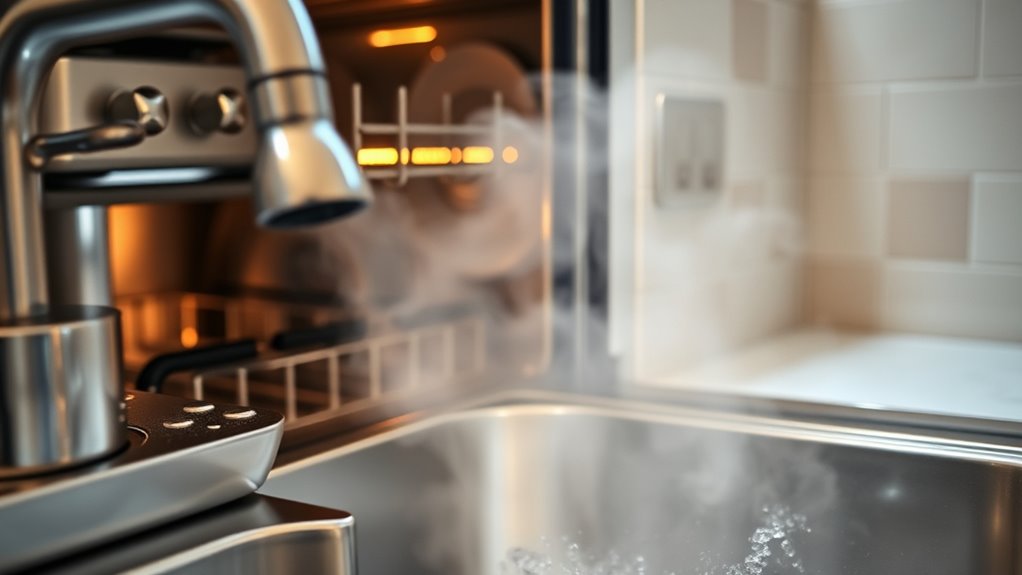
Have you ever wondered why your dishwasher relies on hot water to clean your dishes? It’s a good question, especially since your shower uses a much lower water temperature, yet your dishwasher seems to need hotter water to do its job effectively. The main reason boils down to optimizing energy efficiency and ensuring thorough cleaning. Higher water temperatures help break down grease, grime, and food residues more effectively, making it easier for your dishwasher to sanitize and remove stubborn stains. When water is hotter, it can dissolve fats and oils better, so your dishes come out cleaner without needing to run multiple cycles.
Hot water helps dissolve grease and food residues better for more effective cleaning and sanitizing.
You might think that using hot water would waste energy, but modern dishwashers are designed with efficiency in mind. They typically heat water internally or rely on your water heater, which is often set to a temperature that balances cleaning power with energy conservation. This means your dishwasher uses just enough hot water to achieve ideal cleaning without wasting energy, ultimately making it more energy efficient than relying solely on cold or lukewarm water. While your shower water temperature is usually set for comfort and safety, dishwashers prioritize water temperature for maximum cleaning performance, which sometimes means hotter water than you’d prefer for a quick shower.
Another reason your dishwasher uses hotter water is that it needs to reach specific temperature thresholds to activate certain cleaning and sanitizing cycles. These cycles are designed to kill bacteria and ensure your dishes are hygienic. Cold water simply doesn’t have the same sanitizing power, so the appliance heats the water to the necessary temperature for effective disinfection. This is especially important for households with young children, food allergies, or other health considerations. The hotter water also helps the detergent work more efficiently, breaking down food particles more quickly and thoroughly.
Additionally, the design of dishwashers allows them to maintain a consistent water temperature during the wash cycle. This consistency ensures that every dish gets properly cleaned and sanitized. Your shower, on the other hand, is more about comfort, so the water temperature can fluctuate and often stays lower. The purpose of hot water in your dishwasher isn’t just about cleaning; it’s about achieving a balance between energy efficiency, water temperature, and effective sanitation. By heating water to the right temperature, your dishwasher maximizes cleaning power while minimizing energy waste, making sure your dishes come out spotless and safe to use. Moreover, advancements in projector technology have shown that maintaining precise temperature controls can significantly improve overall performance and longevity of appliances.
Frequently Asked Questions
Does Water Temperature Affect Dishwashing Detergent Effectiveness?
You might wonder if water temperature affects detergent chemistry and effectiveness. Hot water enhances detergent performance by breaking down grease and grime more efficiently, improving cleaning results. It also influences water pH balance, which can impact how well detergents work. Cooler water may reduce some detergent reactions, so using hot water guarantees better emulsification and stain removal, making your dishes sparkle and your cleaning more effective overall.
Can Adjusting the Water Heater Temperature Improve Dishwasher Performance?
Adjusting your water heater settings can boost your dishwasher’s performance. Set the water heater to around 120°F to guarantee hot enough water for effective cleaning without wasting energy. Proper dishwasher temperature helps break down grease and remove bacteria. Check your water heater’s current setting and increase it if needed, but avoid going too high to prevent scalding and appliance damage. This simple change can make your dishes cleaner and improve efficiency.
Why Does My Shower Water Feel Cooler Than the Water in the Dishwasher?
Your shower water may feel cooler than your dishwasher water due to water heater temperature fluctuation. Your water heater might be set high, but if there’s a dip in temperature or the hot water supply is limited, your shower temperature drops. Meanwhile, dishwashers often draw hotter water directly from the heater, ensuring hotter cycles. Check your water heater settings and consider maintenance to keep consistent water temperature for both your shower and dishwasher.
Are Energy Costs Higher With Hotter Dishwasher Water?
Imagine a cozy fire warming your home—hotter dishwasher water does take more energy consumption, and that can increase your cost implications. While running hotter water uses slightly more power, the overall impact depends on your dishwasher’s efficiency. Usually, the extra energy cost is modest, but if you’re aiming to save, using cooler water settings when possible can help manage those expenses without sacrificing cleanliness.
How Does Hot Water Impact the Lifespan of My Dishwasher?
Hot water can shorten your dishwasher’s lifespan if it causes your water heater to work harder, increasing wear and tear. Regular water heater maintenance helps keep temperatures in check, preventing overheating and extending your dishwasher’s life. By maintaining proper water temperature, you reduce stress on the appliance, ensuring it lasts longer and functions efficiently. Proper water heater care is key to protecting your dishwasher and maintaining ideal performance.
Conclusion
So, next time you’re puzzled why your dishwasher’s water feels hotter than your shower, remember it’s all about fighting the grime like a knight facing a dragon. Your dishwasher needs hotter water to break down stubborn stains and kill germs effectively. Think of it as a secret weapon in your cleaning arsenal, working behind the scenes to leave your dishes spotless. Embrace the heat—your dishes will thank you with a sparkling smile.
